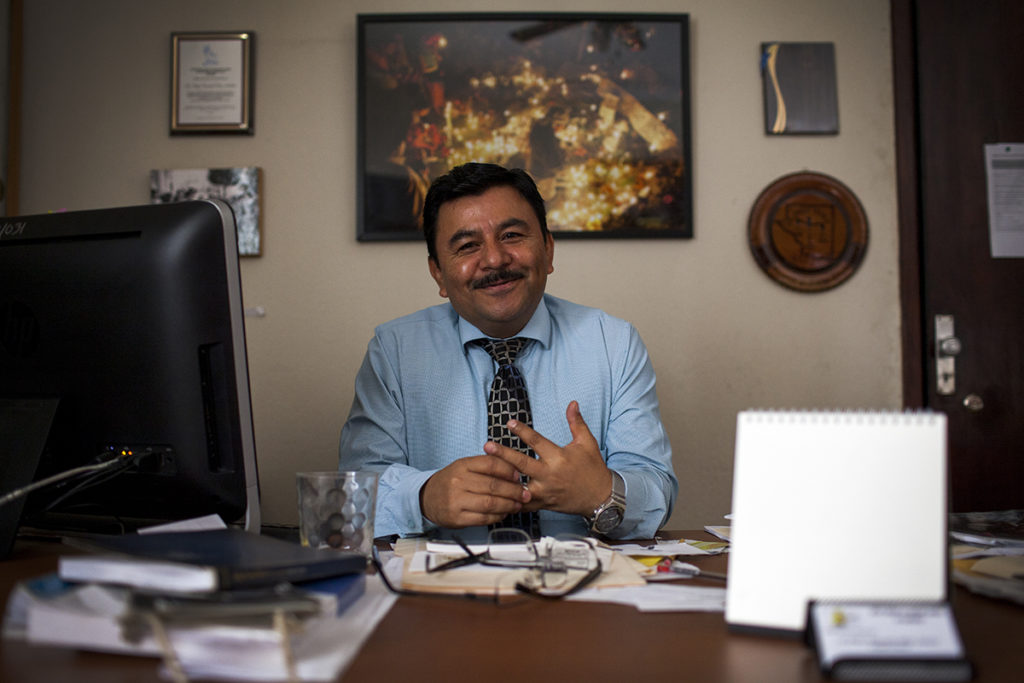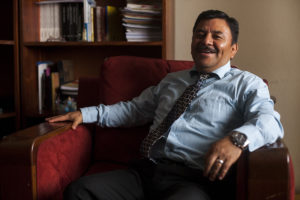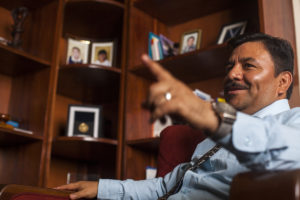The following article profiles Édgar Pérez, the director of the Law Firm for Human Rights (Bufete Jurídico de Derechos Humanos), one of the main organizations representing victims in Guatemala’s grave crimes cases. The article and photos come from the news organization Plaza Pública and are being republished on International Justice Monitor with permission. The original Spanish version was written by Emiliano Castro Sáenz has been translated by Evelyn Recinos Contreras.
Édgar Fernando Pérez Archila has stayed out of the spotlight, even though he was the first to bring military officers responsible for committing grave crimes during Guatemala´s war to justice. He confronted Ríos Montt in the Genocide case representing the Ixil indigenous population, as well as the Panzós, Plan de Sánchez, and Dos Erres victims, among others. In 20 years of practice, this Pan-American Greco-Roman wrestling champion has suffered threats and attacks but has given hope of justice to the war´s victims and human rights defenders.
Hours before a court convicted him of genocide and crimes against humanity, General Efraín Ríos Montt made a gentle gesture toward the prosecutors and civil party lawyers. It was the last hearing day and even though the old general seemed tired, he greeted everyone briefly and courteously. With Edgar Pérez Archila, the civil party lawyer representing the Ixil population, he paused for a couple of minutes. Neither knew what the verdict would be, but in that short encounter, shaking hands and looking at each other, the accused and accuser made peace.
“I understand your job”, said a serene Ríos Montt to the lawyer who for day after day had accused him of the most hideous crimes that can be ascribed to a military person. “You defend one position and we another” he stated. It is a “professional matter” Pérez Archila replied. No “personal” rivalry motivated the case. “I understand that,” replied the serious, erect military man. “So it is,” insisted the lawyer.
That day, May 10, 2013, High-Risk Court A presided over by Judge Yassmin Barrios, condemned Ríos Montt to 80 years in prison for his participation as de facto head of state in the genocide perpetrated against the Ixil population between 1982 and 1983. General José Mauricio Rodríguez Sánchez, former head of military intelligence during the same period, was acquitted.
Ten days later, pressure from conservative groups and legal arguments led to a decision of the Constitutional Court suspending the sentence and ordering a retrial. High-Risk Court B, where the case was transferred, authorized new proceedings to be held behind closed doors, where the general would be represented by his lawyers.
Four years has passed since then. According to his lawyers, Ríos Montt is now prostrate in his residence, does not go out, and cannot care for himself. He suffers from senile dementia and has very few moments of clarity; a group of nurses cares for him 24 hours a day.
Despite the Constitutional Court´s setback for the victims, for Edgar Pérez Archila the conviction was a triumph. One as valuable and exciting as the ones he won, two decades ago, as a Greco-Roman wrestler.
Édgar Pérez Archila is capable of resuming a conversation suspended for several days. He picks up right where he left off; he remembers, like ellipses, what he was saying and immediately begins telling stories, news, insights and even jokes. If he were defined by a gift, it would be his tranquility of speech: he carefully wraps each word in cellophane, then opens it when the time comes with the patience of a collector, and continues.
His life is filled with these presents, which he treats with kindness, respect, and a sense of humor. With the same intonation and rhythm he describes the time he was saved from being murdered, he tells of another encounter with Ríos Montt, when with a single sentence, he reduced the military general to a simple soldier. And he laughs.
The wrapping of ellipses, reflected around his office in simple and modest furniture, also decorates his interventions in court. The restraint with which he addresses adversaries, judges, and defense attorneys has earned their respect and admiration inside and outside the courtroom.
The Greco-Roman Lawyer
Édgar Pérez was born in the Guatemalan capital 49 years ago. He grew up in the midst of Guatemala´s war, but he was not aware of the reality the country was facing until he represented it abroad as a Greco-Roman wrestler. The lawyer is the fifth of seven children from a couple of laborers: a mason who was a soldier for a short time, and a housekeeper who tried her luck working in factories, cafeterias, and laundries.
In 1969 his parents were guardians of the German School. His dad helped to build the building and then became its official caretaker. They lived in a wooden house and enjoyed the school’s facilities. With his siblings, he remembers sneaking into the school pool and gym. “We were a pain for our parents,” he recalls. He spent his first eight years between the German School, the Salesian mission, and the parking lot of Palmieri Transport – all in the same vicinity.
His father, with the intention of having a house of their own, took the family to the Sakerti neighborhood, an appendix of the Bethania neighborhood in zone 7 of the capital, built after the 1976 earthquake. It is a marginal part of the city inhabited mostly with migrant workers and peasants trying to escape the poverty of rural areas. He lived there until he became a lawyer and a public notary, married, and moved to a residence of his own in in a middle-class condominium along the Atlantic highway, where he lives with his wife and three children.
Before finishing college, the short, mustachioed, round-eyed jurist, spent a period in a jersey, practicing Greco-Roman wrestling. Although a sport rarely practiced in Guatemala, it and athletics are the world´s oldest sports, appearing in cave paintings from 3000 B.C. It was introduced in the Olympics Games in 708 B.C. and was one of the attractions at the beginning of the modern Olympics Games, in Athens in 1896; it was considered the reincarnation of the struggle between Greeks and Romans.
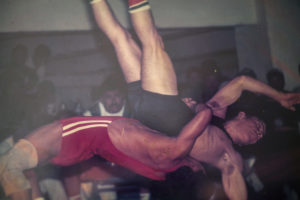
Édgar Pérez – in the red suit – during a Greco-Roman wrestling competition at the 1994 Central American Games.
Greco-Roman wrestling is a discipline that allows the wrestlers to use only arms and torso to attack their opponent. They must always attack above the waist, using arm drags, bear hugs, and headlocks to pin an opponent´s shoulders to the floor; all of this trained and tempered Edgar Pérez, the lawyer. This sport allowed him to travel, win gold medals, and, most significantly, to recognize the country’s political situation.
Pérez Archila was part of the national Greco-Roman wrestling team between 1988 and 1997, when he became a lawyer and a public notary. He was twice the Central American champion, in 1990 and 1994. In those years he was also declared athlete of the year by the Guatemalan Olympic Committee and Sport Association of Guatemala, won second place for Central America and the Caribbean in 1990, and third place in the Pan-American games of Mexico in 1994.
In 1988, only two years into the sport introduced to him by an uncle, he was already on the national wrestling team and traveled around the world representing Guatemala. During a competition in Canada he noticed many Guatemalans in the audience, watching his performance, but with no interest whatsoever in the sport. What they really wanted was to ask the athletes about the situation in the country.
“Despite the fact that I studied in the Central School (Instituto Central para Varones), I had no awareness of the real situation. Traveling, I understood that the people watching us wrestle were displaced. Peasants, professionals, laborers. All types of Guatemalans. One of the professionals living in Canada invited us to his house, but I felt he was bitter. He had a good life there, no financial problems, but soon I understood that he was bitter because he wasn’t able to return to his country,” he remembers.
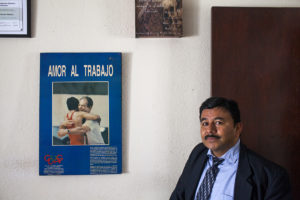
The poster dedicated to Cuban coach Alberto Arbesú Santiago, with the photo that shows them embracing, just after Édgar won the gold medal at the 1994 Central American Games in El Salvador.
That, and reading the book Masacres de la Selva (Massacres in the Jungle) by the Jesuit priest Ricardo Falla one year later, awakened his conscience. Knowing that the Army had killed so many people, and studying law and social sciences in the San Carlos University, helped him to understand the country’s reality. In addition came a commitment to human rights and justice.
His most memorable moment as a wrestler came in the Central American Games of San Salvador in 1994, where he won the gold medal in the 54 kilogram weight class. Pérez was not supposed to participate due to several knee injuries, but he managed to do it with the encouragement of his coach, the Cuban Alberto Arbesu, who died a year later. Arbesu was an irreverent man who had run-ins with the Sports Association of Guatemala (Confederación Deportiva Autónoma de Guatemala). Although he managed to inscribe his pupil, he had no more resources than strictly necessary, and had to buy knee pads himself.
Two years later, after failing to qualify for the 1996 Atlanta Olympic Games, Pérez left the mat. He was about to graduate and had other plans. The lawyer was emerging who would bring a dictator to justice.
A Law Firm to Defend Everyone
Inside a big, old house between zones 1 and 2 of Guatemala City, Édgar Pérez Archila takes down a black and white photograph hanging on the wall. It depicts a meeting with residents of Choatalum, Chimaltenango, after achieving the first conviction for the enforced disappearance in Guatemala: that of former military commissioner Felipe Cusanero Coj, sentenced in September 2009 to 150 years of prison for the enforced disappearance of six people, in the context of military repression between 1982 and 1984.
In another photograph from 2009, a group of people are participating in the 27th anniversary of the massacre of 177 people at the top of Mt. Pakóxom in Río Negro, Baja Verapaz. The army massacre perpetrated in March 1982 evicted the population ahead of the construction of the Chixoy hydroelectric dam. The trial took place between 1993 and 1999, and Pérez took part in its last two years. The trial ended with the conviction of three commanders to 50 years imprisonment. And nine years later, five former military patrol leaders from Xococ were sentenced to 780 years in prison (30 years for each of their 26 victims).
In Pérez´s dark office, Greco-Roman wrestling medals, international awards, family photographs, and seas of disordered documents are piled on shelves, the coffee table, and his desk. “It’s a mess that I understand,” he apologizes, with a smile from ear to ear.
This year, Édgar Pérez Archila celebrates two decades as a lawyer. In twenty years of practice he has won many cases and has become a pioneer in strategic litigation. It is a model that through the selection and presentation of cases, seeks to leave a mark beyond the criminal proceedings: to modify jurisprudence, and change laws, regulations or administrative practices in order to elevate standards for the protection of human rights. All of this out of the spotlight.
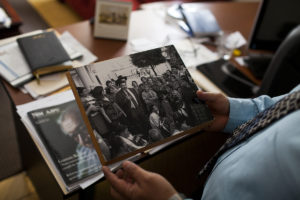
In a 2009 photo, Pérez is shown attending a meeting in the village of Chuatalun, Chimaltenango, to prepare the indictment of what will become the first judicial case of forced disappearance in Guatemala.
By now, he has become an expert in the country’s historical and political context. He understands the war’s consequences and knows the international treaties the state has signed to seek justice and historical clarification.
Seven years ago he founded the Law Firm for Human Rights (Bufete Jurídico de Derechos Humanos, BDH), which he directs today. The law firm charges no fees when the trial ends, and no percentage is taken from a victim´s reparation. The firm survives through international support (European Union, Ford Foundation, Diakonia, Human Rights World Funds, Open Society Foundations, and the Swiss Embassy), and sometimes, a client who can afford to pay.
From its inception, almost 25 lawyers have collaborated in the firm. Currently, 11 legal professionals share the tasks of litigation, assistance, analysis, investigation, and research. They are supported by young international or Guatemalan lawyers, or law students nearing graduation. A psychologist and administrative staff complete the team. War victims make up 95 percent of the firm’s clients. The rest are Mayan authorities or land defenders.
The law firm was created with the support of the Lawyers Without Borders Canada, who noticed after visiting the Human Rights Office of the Archdiocese of Guatemala (Oficina de Derechos Humanos del Arzobispado de Guatemala, ODHAG), the Center for Legal Action on Human Rights (Centro para la Acción Legal en Derechos Humanos, CALDH) and The Association of Families of the Detained and Disappeared of Guatemala (Asociación de Familiares de Detenidos y Desaparecidos de Guatemala, FAMDEGUA), among others, that all of them had the same legal advisor, Édgar Pérez, who worked from his own office.
Pérez Archila began litigating in CALDH, where he soon became known as “Super Lawyer,” due to his intelligence, and for his resemblance to Mighty Mouse, the cartoon rodent who is invincible despite its size.
The Law Firm for Human Rights is one of the main players in transitional justice and human right defender’s cases in Latin-America. It has worked on cases of torture in San Juan Cotzal, enforced disappearance in El Jute, Chiquimula, and the disappearance of the students Édgar Fernando García and Édgar Leonel Paredes Chegüen, as well as the massacres including Panzós, Plan de Sánchez, Dos Erres, and the 1981 burning of the Spanish Embassy.
Currently, under Pérez’s direction, the firm is focused on the CREOMPAZ case, the Dos Erres massacre and genocide, and the Ixil genocide, which are all tied up in legal motions and appeals. The firm is also handling the cases of land defenders in Huehuetenango, Cobán, San Marcos, Petén, Alta Verapaz, La Puya and the Ch’orti region.
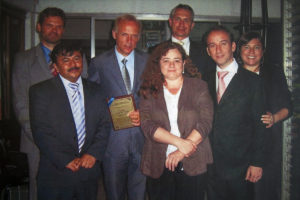
A photo from the files of Pérez, where he appears alongside the former Attorney General Claudia Paz y Paz.
Attorney Hector Reyes, who began his career in human rights in 2004, identifies Pérez as an institution. “Édgar is the pioneer of these cases. You can learn a lot from him. I have always seen him as a reference. I call him “boss” as a gesture of affection.
According to Reyes, Édgar Pérez is also “a reference point for defendants”. This explains why Ríos Montt approached him to talk and shake hands. “He has created a way of working, of professionalism, of love of the job, and doing things with a purpose. If we follow his lead, it means we’re doing things right.”
For his career achievements, Pérez Archila was given the Monseñor Gerardi award in 2009, as well as the prestigious international award “Invisible Mandelas,” granted last year in London by the International Peace Brigades. The American Bar Association (ABA) granted him the International Human Rights Lawyer Award in April 2012.
The latter award is one of the most prestigious in the legal world and is not granted every year. Pérez Archila was a recent awardee, preceded by such individuals as Gao Zhisheng in 2010: a defender of religious minorities and corruption victims, who was nominated for the Nobel Peace Prize, who was missing until 2014 and is now under house arrest. Or the Mexican lawyer Digna Ochoa, who was honored post-mortem in 2003 for her work defending environmentalist peasants and political prisoners (students and Zapatistas), and was allegedly killed in 2001, although the official version claims she committed suicide.
The ABA highlighted in 2012 that, “Édgar Pérez has confronted army forces and the economic and political elite of Guatemala, and he has managed to break the wall of impunity that exists in this country, despite threats to his life and intimidation he has suffered.”
Upon returning from New York, where he [received the ABA] award, Pérez saw Ríos Montt in a hearing. He went to great his colleagues, he recalls, and the first one to offer his hand was Ríos Montt. “Congratulations,” he said.
Court Complexities
In some moments, ephemeral and rare instants, Pérez´s kind and polite smile disappears, as he sinks in thought. Like he’s lost in the recollection of his story. Then he looks into your eyes, and you can again feel the warmth of his gaze. It happens when he recalls walking near the edge of the abyss. Moments in which forces of the status quo were trying to take revenge.
After the genocide case, he and his family had to leave the country, to protect against threats of violence against him, even though it was only for the first 10 days after the sentence. During the hearings, he was accompanied by staff from the Peace Brigades, who picked him up and dropped him off. He says he will never allow a person with a gun next to him. “If they want to kill me, they are going to, no matter who’s by my side. I don’t act in bad faith. If I present a claim, it’s because there is evidence that supports the arguments. I don’t have to hide anything, or fear anything.”
The brakes of his Toyota Tercel were intentionally damaged during the Río Negro trial. “The mechanic told me they had loosened the brakes just a bit, so that with use they would fail, and it would appear to be an accident,” he recalls.
In 1999, he participated in the trial of former military commissioner Cándido Noriega, against whom charges had been twice rejected during the investigation phase. Noriega finally was sentenced to 220 years in prison for six homicides and two murders perpetrated between 1982 and 1983 at the Tuluché estate in Quiché. He ended up serving 20 years before returning home, where he lived until he was 79; he died there this April 30.
It was hard for Pérez to explain to the victims that it was impossible to charge Noriega for all the perpetrated crimes. “I went there for a couple of weeks to let them know, and they were so angry I thought they were going to lynch me. They couldn’t accept that such crimes as chicken theft weren’t a part of the process. At the end, they understood that he deserved jail and maybe focused charges could achieve it,” he said.
He also felt intimidated when Noriega’s daughters came to a hearing carrying guns, which they then left at the court’s entrance in Salamá, and when a teacher was killed by the sons of Flavio Monzón, one of the defendants in the Panzós massacre. According to Pérez, the prosecutor was bribed by Monzón´s family members. The prosecutor called and told him, “The case is very weak,” and said he had some money saved for him. Pérez reported the prosecutor and got the case moved to Salamá. Monzon´s family was furious.
The day he presented the charges in 2002, the defendant’s family came to the hearing armed. When the hearing was over they followed him from Salamá to El Rancho. He tried to convince himself that this was just a coincidence, but when he hit the accelerator – to more than 130 km/h – and they continued to tail him, he thought they were going to kill him. He started driving very slow and they continued to follow him. “Oh my, I told myself: now they are really going to kill me. It went on like that for three or four kilometers. But they weren’t doing anything. I resumed a normal speed and decided not to look in the rear mirror again,” he recalls. When they reached El Rancho, they turned back. “They wanted to scare me,” he thinks, looking back.
Sometime after that, he received an anonymous call: “Stop messing around. We’re going to break your ass,” he heard. “I can’t say I wasn’t scared; I spent a week mistrusting anyone who came near me. I didn’t tell my wife or anyone. It was an ugly thing,” he says. Weeks later, his office located then in the 6th street of zone 1, another message: they covered the door and handle with excrement. His colleagues, with whom he was sharing office, blamed him because they didn’t have high risk cases. “What cases are you taking?” they would ask him.
Uncomfortable Opponent
It’s not all compliments for the Greco-Roman lawyer. Some people can’t stand the slow pace of his speech and accuse him of making human rights a profitable “business.”
Francisco García Gudiel, Efraín Ríos Montt´s defense attorney in the 2013 Ixil Genocide case, says he has not seen him succeed in any field other that international cooperation and war victims. “I couldn’t say if he’s good or bad. He deserves my respect, I have to say it, but really, as civil party attorneys, they only have to help the prosecutors in the investigation. They bring so little to the process. In General Ríos Montt’s case, they basically supported whatever the prosecution was saying. Without him the case would have ended in the same way: a case that doesn’t exist today,” says Gudiel.
Referring to Édgar Pérez´s expertise in strategic litigation, he describes it as “deplorable” and says that the process lacks objectivity. “The main concern of a jurist is the correct application of law and seeing justice done. As jurists, we are called to apply the law, to give everyone his or her due, with respect for constitutional rights. In seeking my clients conviction, they failed to do so. [Prosecutors and civil party attorneys] have seen legal irregularities and proceeded anyway,” says Gudiel.
His supporters, such as FAMDEGUA Director Aura Elena Farfán, who was represented by him in the Dos Erres case, El Jute, and others, says “the world needs many Édgar Pérez’s: committed lawyers with a deep love of their work.” Helen Mack, director of the Myrna Mack Foundation, who met him in the Dos Erres trial, says “before him, no lawyers wanted to take these cases and Édgar had the courage and commitment to do so.” His role, she adds, “has been important because he has taken cases of collective human rights. He was one of the first lawyers to come forward.”
However, César Calderón, attorney for former president Otto Pérez Molina and former defender for general José Mauricio Rodríguez Sánchez, also accused of genocide and crimes against humanity, says that Pérez Archila’s career “is common, like any other lawyer who litigates.”
“I believe he’s a good lawyer defending causes that I don’t share, but he does well in his field of work. I don’t see his flaws. Rather, he’s becoming an expert in the subject, especially because he works on the same thing all the time.” But being a good lawyer doesn’t make him different. Field diversity is “the joy of the job, unless you have an economic interest, I can’t understand that you stay focused on only one subject,” he says.
Édgar Pérez faces criticism for expounding on his views every time he steps to the microphone. “As a lawyer, I can’t ignore the context. The judge is not supposed to know it all, and it is the parties’ duty to explain the context in which the crime was perpetrated. It’s not the same to say that a common murder was committed, or to say that a murder was committed in a context of political repression. Organized crime is not the same thing as a government squad trained to kill civilians. You have to explain these things in a hearing,” he says.
In the end, he says, what he seeks with his work, besides justice for the victims, is for someone, even just one person, to learn Guatemala’s true history. Such as a family that stopped supporting the Army after the genocide trial. Or his own parents, with whom he always avoided ideological issues, but who asked him to be careful “of the risks involved in holding powerful people accountable.” But now, he says, full of pride: “My mother is more aware of what human rights are.”

